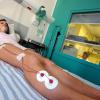A group of scientists has developed a computational DNA droplet with the ability to recognise specific combinations of chemically synthesised microRNAs (miRNAs) that act as biomarkers of tumours.

Using these miRNAs as molecular input, the droplets can give a DNA logic computing output through physical DNA droplet phase separation.
Professor Masahiro Takinoue from Tokyo University of Technology said: “Even though biological systems regulate their functions by combining biosensing with molecular logical computation, no literature is available on integration of DNA droplet with molecular computing.”
Developing this DNA droplet required a series of experiments. First, they designed three Y-shaped DNA nanostructures called Y-motifs A, B, and C with three sticky ends to make A, B, and C DNA droplets.
The team used linker molecules to join the A droplet with B and C droplets. They evaluated the “AND” operation in the AB droplet mixture by introducing two input DNAs.
They then introduce breast cancer tumour markers, miRNA-1 and miRNA-2, to the AC droplet mixture as inputs for the AND operation. The AND operation was successful, implying that the computational DNA droplet identified the miRNAs.
Image credit | iStock



